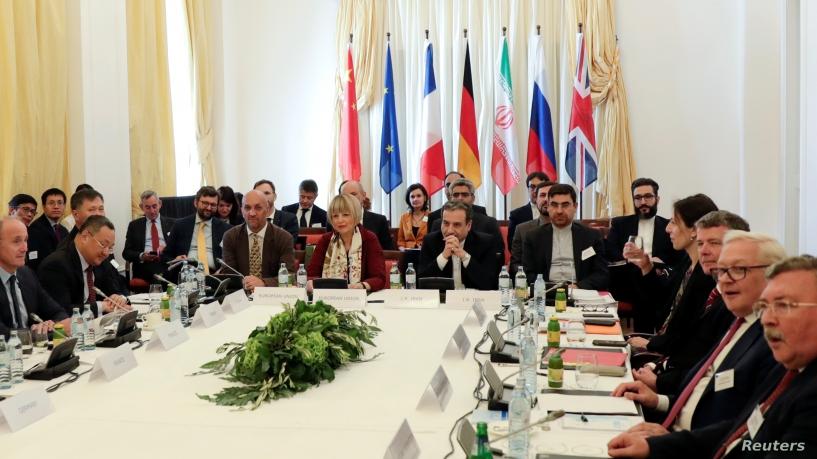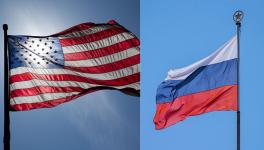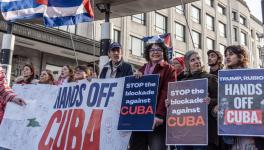European Diplomats Fail to Take Concrete Steps to Reassure Iran Against US Sanctions

The Vienna meeting on the future of the Iran nuclear deal failed to provide any concrete assurances to Iran.
On Monday, July 1, Iran announced that its stock of low enriched uranium had exceeded the 300 kg limit prescribed by the Joint Comprehensive Plan of Action (JCPOA) or the Iran nuclear deal. This development was the natural consequence of the imposition of US sanctions, which prevented the Iranians from exporting this enriched uranium as per the stipulations of the deal. The deal also gives Iran the right to not fulfill its commitments if the US withdraws from it, as it did by imposing sanctions last year.
Ever since the US imposed sanctions, Iran has repeatedly asked the other signatories to the deal, especially the European countries, to find ways to preserve the agreement. However, the few steps these countries took have failed to have any significant impact. The joint committee on the 2015 Iran nuclear deal met on June 28 in the Austrian capital, Vienna, to discuss the future of the JCPOA. After the meeting, the Iranian deputy foreign minister and head of the Iranian delegation, Abbas Aragchi, called the meeting a “step forward” in the right direction but still short of expectations.
The diplomats from the European Union (EU), the United Kingdom (UK), Germany, France, Russia and China met with Iranian diplomats in the quarterly meeting of the committee. The occasion was used by the European diplomats to launch the Instrument in Support of Trade Exchanges (INSTEX).
INSTEX is a mechanism through which European countries can trade with Iran while skirting the US sanctions. Mostly, essential commodities such as medicines would be exported to Iran in exchange for other commodities. However, the variety and volume of trade under INSTEX would be limited. Iran is not happy with it and wants a more concrete step.
The Chinese delegate voiced his opposition to the sanctions after the meeting and declared that China is willing to do everything in order to save the deal and “maintain legitimate economic and trade relations with the country,” Xinhua reported.
After the unilateral withdrawal from the deal last year, the US ended the exemptions given to eight countries, including China, from these sanctions in May with the stated objective of “bringing the oil export from Iran to zero.” Since then, the US has imposed fresh sanctions and categorized the Islamic Revolutionary Guard Corps (IRGC), an elite military institution, a global terrorist group. In the last week of June, the US also imposed sanctions on Iranian supreme leader Ayatollah Khamenei and nine other officials of the IRGC. There were talks of sanctions against Iranian foreign minister, Javad Zarif, as well. It was in response to this has Iran let its stocks of enriched uranium cross limits set by the treaty.
Russia and China have already strongly criticized the US moves against Iran. Members of the EU, France, UK and Germany have also opposed the US sanctions but asked Iran not to violate the JCPOA. But Iran has claimed that it cannot be expected to follow the deal unilaterally when other parties fail to fulfill their commitments.
The tension in the Persian Gulf has risen since the imposition of these sanctions. The US has increased its diplomatic efforts and military presence in the region allegedly to save “the interests of the US and its allies from Iran and its proxies.” It has deployed a couple of warships and increased the number of armed personnel. Iran has threatened to block the Strait of Hormuz through which 30% of the world’s energy resources pass, in case it is attacked. The US and its allies have also blamed Iran for the attacks on oil tankers on two different occasions. The tensions skyrocketed when Iran shot down a US spy drone inside its airspace on June 20.
At the time of the Vienna meeting, the US special representative for Iran, Brain Hook, was touring European countries. He met representatives from the UK, France and Germany in Paris to convince them about the so called “Iranian threat”. So far, the Europeans have opposed the US sanctions and advised a diplomatic solution to the tensions between the US and Iran.
Meanwhile, French president Emmanuel Macron said during a tour to Japan that he would talk to Trump and try to convince him against a war with Iran. During the G20 meeting held in Osaka, Japan, on June 28 and 29, Macron also declared that if Iran chose to violate provisions of the JCPOA, Europe would not impose any sanctions against it. He had earlier warned Iran against violating the deal and enriching weapons-grade uranium. The main allegation of Donald Trump is that Iran wants to have nuclear bombs. Iran has affirmed time and again that they do not want to develop a nuclear bomb.
Get the latest reports & analysis with people's perspective on Protests, movements & deep analytical videos, discussions of the current affairs in your Telegram app. Subscribe to NewsClick's Telegram channel & get Real-Time updates on stories, as they get published on our website.























